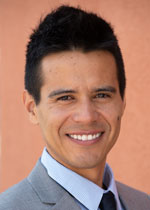Recent News
Ferenchak named chair of Transportation Research Board Pedestrian Committee
October 31, 2025
Ferenchak named APBP 2025 Research Professional of the Year
October 1, 2025
UNM professor to speak at TEDxABQ event
September 24, 2025
NSF funds research to investigate whether treated wastewater can help mitigate water scarcity in arid regions without compromising river ecosystem health
September 2, 2025
News Archives
Dr. González-Pinzón and students from a graduate course publish a peer-reviewed manuscript
July 8, 2019
A peer-reviewed manuscript that was developed with the students enrolled in his CE 598 Ecohydrology course in the Fall 2018 semester has been published.

Dr. Ricardo González-Pinzón dreamed of publishing the work developed with graduate students during a course because that would allow him to demonstrate to the students what it takes to develop an idea, gather preliminary data, develop adequate methods, perform experimental work to validate the concept, write up all the work and go through the peer-review process until the manuscript gets published.
In their publication, they present a new technique to monitor environmental systems. They tested and validated The Integrator technique using experimental data collected from a heart rate monitor (high-quality, high-frequency data in response to known excitation events) and solute tracer experiments conducted in two contrasting (4th and 7th order) rivers. In the Supporting Information, they provide details concerning the design of The Integrator device used in our field case studies and provide insight into potential improvements.
From this experience, he feels that it is absolutely possible to craft courses in a way that students can get to publish their hard work.
Fun facts: Something that he had always wanted to do was to use data from his heart rate monitor to demonstrate the linkage between processes taking place in watersheds and in human bodies. In The Integrator paper, we used data from two of my workouts (cycling and running) to validate our development. We also described analogies between monitoring (pre)diabetic patients and fluvial networks with high-resolution sensors and touched on the importance of developing technologies for the “real world”, where most watersheds lack instrumentation but research is needed to understand biogeochemical cycles at the planetary scale. To make that point clearer and highlight the drastic gaps on hydrologic research done in intertropical and southern latitudes, we stated: "imagine the frivolous alternative fate of humanity had Charles Darwin done all his research just in England, even with unlimited access to what was considered cutting-edge technology in his days!"
